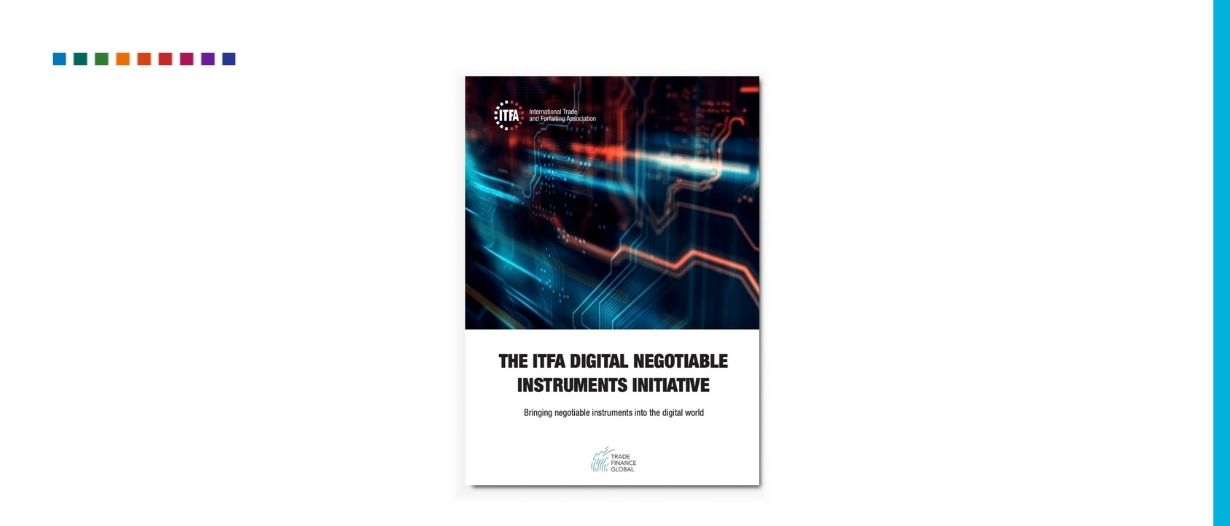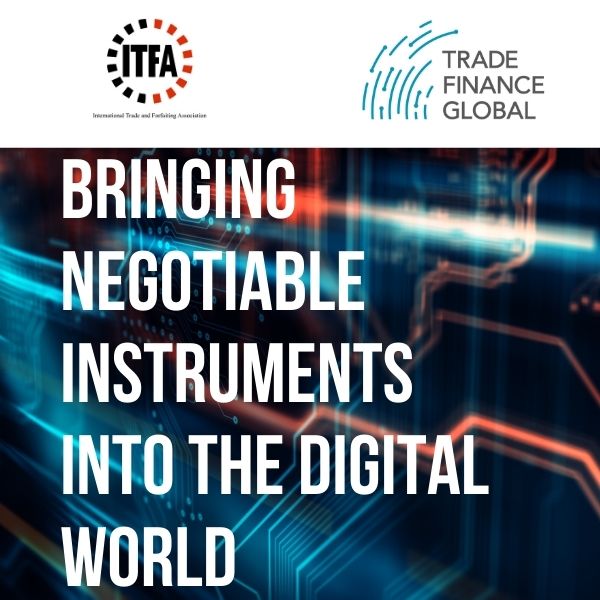We are delighted to partner with ITFA to launch our latest guide: the ITFA Digital Negotiable Instruments initiative: bringing negotiable instruments into the digital world.
Digitizing global trade has been a steadfast endeavour since before the outset of the COVID-19 pandemic, but pandemic-induced closures and remote work norms have vastly accelerated its need. Unlike in previous eras, it is no longer the state of technology that is holding back this cause, rather the limitations now stem from the legal and regulatory frameworks that global trade operates within.
ITFA has established the Digital Document (dDOC) specifications, laying out the mechanisms and requirements for digital original documents to achieve regulatory compliance. These specifications make use of E-signatures, cryptography, and distributed ledger technology (DLT) to create digital documents that effectively replicate many legally necessitated properties of paper.
By applying these specifications to digital documents that replicate negotiable instruments, such as bills of exchange or promissory notes, the ITFA has created a type of digital negotiable instrument (DNI) that is referred to as an electronic payment undertaking (ePU).
On the legal side, ITFA has created a functionally equivalent instrument – the electronic Payment Undertaking (ePU) – that operates in the same way as the Bill of Exchange and Promissory Note, delivering the benefits of a digital negotiable instrument under English law. The ePU delivers a natively digital irrevocable, unconditional, and independent payment undertaking that fulfils all requirements of a traditional negotiable instrument, albeit subject to contract law rather than common law.

Sean Edwards, Chair, ITFA explains: “Following engagement with the UK Law Commission in which ITFA played an important part, we are very hopeful that the law on electronic instruments will change in 2022 but unless and until that happens, the ePU is ITFA’s immediately available solution for the digitisation of negotiable instruments.”
On the technology side, the ITFA Fintech Committee has produced the dDOC specifications which formalise a technology framework to leverage cryptography and public DLT in a manner that is interoperable with existing practices, systems, and channels. dDOC-compliant documents are natively digital originals that are portable amongst financial institutions, their correspondent banks, their clients, and any third-party platform. We are happy to report such technology is already in implementation by corporates for the presentation of transport documents (CMR) as part of the Convention on the Contract for the International Carriage of Goods by Road

André Casterman, Chair Fintech Committee, ITFA adds: “The dDOC specifications aim to foster collaboration between technology companies and initial proof points have been delivered as both China Systems and Finastra have integrated Enigio’s dDOC-compliant document technology. This is a hybrid approach whereby we combine legacy and new technologies deliver the shortest time to market and lowest adoption cost.”
Contents of the whitepaper
1 | Digital Negotiable Instruments – Home
2 | Introduction to Digital Negotiable Instruments
3 | Digital Documents
4 | Digital Trade Instruments
5 | Electronic Payment Undertaking (ePU)
6 | Legal Issues of Digital Negotiable Instruments
7 | ePU Template Wording





























